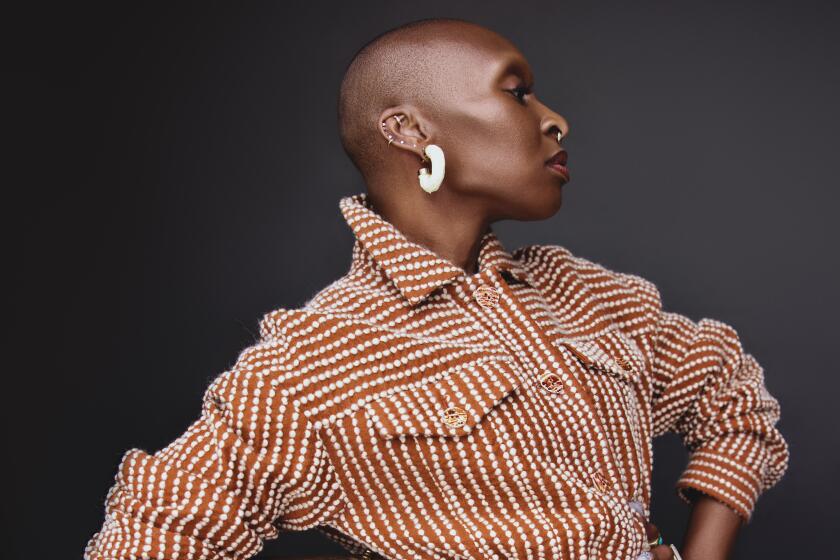Review: ‘War Horse’ at Ahmanson Theatre is a marvel of stagecraft
- Share via
What gruesome casualty statistics fail to do, a horse made of wire mesh and plywood pulls off with profound simplicity: Joey, the magnificent puppet stallion at the center of”War Horse,”communicates to a broad public the staggering waste of war.
Yes, it’s sentimental. Yes, there are scenes that might have given even as inveterate a melodramatist as Charles Dickens pause. But this 2011 best play Tony winner, which launched its national tour at the Ahmanson Theatre on Friday, takes the audience on a thrilling roller-coaster ride in which innocence is thrown into a man-made hell. For a couple of nerve-racking hours, humanity’s very soul seems to depend on the survival of one galloping steed.
Adapted by Nick Stafford from Michael Morpurgo’s novel, “War Horse” moves from picturesque rural England to the blood-splattered trenches of World War I. A love story between a boy and his horse, the show provides an opportunity for adults to reconnect with the childhood enchantments of bedtime fables, folk tales and storybook adventures.
Credit the extraordinary ingenuity of Handspring Puppet Company for exciting that area of our brains that controls wonder. Yet the magic is hardly one-dimensional. The production, which began at the National Theatre of Great Britain before taking New York by storm, is a marvel of integrated stagecraft.
This touring version of the show, directed by Bijan Sheibani following Marianne Elliott and Tom Morris’ original staging, incorporates a sprawling ensemble, a slew of barnyard denizens and creatures of the sky courtesy of Handspring, pulsating projections and animation designed by 59 Productions and music of a sprightly pastoral bent credited to Adrian Sutton and “songmaker” John Tams.
The horses, manipulated by teams of actors, turn puppetry into a branch of poetry, so lyrical is their movement. The range of expression of these carpentered cast members actually seems to surpass that of their human costars, whose acting (while vivid across the board) is more monolithic, less soulful. It is the interior life of these animals that draws us in.
The character of Joey is practically Chekhovian. The way he sulks in his stall or pitches the occasional fit, the dignity he displays while pushing ahead with the daily grind, his unspoken but nonetheless eloquent loyalty, the tendency when suffering to hang his head and become lost in thought — this is no ordinary horse but a dramatic role fit for a young Marlon Brando!
Handspring’s genius, it should be noted, isn’t limited to equine forms. There’s a busybody goose on wheels honking around the farmhouse where Joey lives who is a corker. I can’t remember who won the Tony Award for featured fowl last year, but let me tell you, this bird was robbed.
Subtlety, I should emphasize, is not the work’s strong suit. Every trick in the book is used to ratchet up the suspense and intensify our emotional investment.
Albert (Andrew Veenstra) is a rosy-cheeked lad who melts the moment Joey, a spirited foal, enters his life. Ted (Todd Cerveris), Albert’s hapless, pub-dwelling father, used the mortgage money to outbid his contemptuous brother Arthur (Brian Keane), who still wants to get his hands on the horse. Rose (Angela Reed), Joey’s capable mother, can’t understand what they’re supposed to do with a show pony, but her soft heart is touched by her boy’s devotion to his new four-legged pal.
One crisis leads to another. Joey is required to turn this hunter into a plow horse or lose his beloved new friend in a bet made between his irresponsible father and the ever-conniving Arthur. (Adult men don’t come off too well in “War Horse,” at least until the senseless, generation-decimating war humbles them with grief.)
After this challenge comes an even more formidable one. Joey is sold to the cavalry by Ted as his son looks on in horror and rage. Youth cannot escape the treachery of adulthood, but Albert is not prepared to say goodbye forever. The battlefield scenes that follow are harrowing, requiring both hankies and a companion’s arm to clutch.
I confess that when I first encountered the work at the Lincoln Center’s Vivian Beaumont Theater, I was not in the mood to have my feelings manipulated for 21/2 hours. The spectacle was indeed mesmerizing. (Rae Smith’s superbly coordinated sets, costumes and drawings were given a larger canvas in New York; at the Ahmanson, the effect is more cramped though still engulfing.)
But I resented the exploitation of my admittedly acute sensitivities to animal cruelty even in the name of a good cause. A torturous-to-watch scene involving barbed wire had me muttering, “I can’t take another minute more of this.”
But having sat through the Joey saga another time with the Steven Spielberg film, I must have become sufficiently desensitized, because I think I shouted out only once at the Ahmanson and my friend had no complaints of black-and-blue marks on her arm.
“War Horse” obviously won’t change the course of historical events, but at a time when our battles are being fought by drone aircraft and segments of the population marginalized by a mainstream more interested in reality TV than in the marathon drama in Afghanistan, anything that drives home the shock and awe of shock and awe is invaluable. Melodrama has its uses, and Joey should be awarded the military’s highest honor.
------------------------------------
‘War Horse’
Where: Ahmanson Theatre, Los Angeles Music Center, 135 N. Grand Ave., Los Angeles
When: 8 p.m. Tuesdays-Fridays, 2 and 8 p.m.Saturdays, 1 and 6:30 p.m. Sundays. Call for exceptions. Ends July 29
Price: $20 to $150. Ticket prices subject to change.
Contact: (213) 972-4400 or https://www.centertheatregroup.org/warhorse
Running time: 2 hours, 30 minutes
More to Read
The biggest entertainment stories
Get our big stories about Hollywood, film, television, music, arts, culture and more right in your inbox as soon as they publish.
You may occasionally receive promotional content from the Los Angeles Times.











